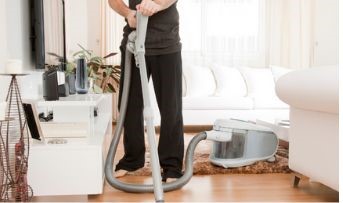General Insurance Blogs, Articles & Updates by - Magma HDI
Have us call you
- RENEW YOUR POLICY
- BUY NEW POLICY

Here are a few reasons why your two-wheeler may be making strange noises
If you are a bike rider, you know that your bike needs to be regularly serviced to ensure a smooth and safe ride. Regular maintenance and check-up can go a long way for your two-wheeler. But, while you can grease and tighten the loose parts at home, it is better to leave the work for the experts. Today, we will look at the weird noises your two-wheeler makes and how you can identify the source of the problem.
This article will help you make an informed decision as to when to take your bike to the mechanic and when you can fix it yourself.
1. Clicking sounds:
You might have heard a periodic click from your two-wheeler on many different occasions. Although it can be a complex process to locate the exact source of the sound, you might be able to find it eventually with the help of a mechanic.
A mechanic's gadgets can be useful tools to help you find the source. A small gap, loose fittings, or a hole caused due to rusting can all be reasons for the clicking sounds.
2. Gurgling sounds:
Gurgling sounds arise when there is a problem with the cooling system. Any drop in the level of the coolant is indicative of an issue. For example, the pump cannot circulate the coolant properly if there is an air gap, and it starts to boil if it cannot move away from hot areas. This could result in the gurgle.
3. Ticking sounds:
If your bike makes a ticking sound when it reaches a particular speed, it usually indicates some damage in the valve clearance. Immediately get it inspected by a mechanic. Loose valves can affect the performance of your vehicle.
4. Whirring sounds:
Whirring sounds are invariably caused due to the drive chain. Chains generally make sounds. But if you hear anything out of the ordinary, it's time you get them checked. Cleaning your chain and examining loose rollers and stretches can help you resolve the problem.
5. Knocking sounds:
Knocking sounds are directly connected to the engine. Worn-out shells and collapsed bearings can hinder your engine's performance and be catastrophic. If you hear them while driving, you should immediately park the vehicle to safety and inspect the problem. It is also recommended to call a mechanic to fix the issue.
6. Whining sounds:
Whining sounds are clear indicators of gearbox issues. Gears work in pairs, and a problem in either reflects on the other.
7. Clattering sounds:
Clattering sounds could be indicators of issues with the chain or tensioner. Since chains undergo wear and tear over time, it leads to fatigue in the tensioner. This is not as dangerous as knocking sounds, but it can affect the bike's performance.
8. Popping sounds:
Checking the exhaust pipes for gaps or gas leakage should be the first step when you hear popping sounds.
These are the few sounds that you might have heard from a two-wheeler. After the preliminary examination, it is best to take your vehicle to a mechanic. They will be able to provide you with solutions for the same.
Sometimes you might need to change parts of your bike if the damage is severe. This can be expensive and burn a hole through your pockets. But, having your two-wheeler covered under insurance can do wonders for you. A good 2 wheeler insurance acts as a shield against such unprecedented expenses and offers several benefits that can be advantageous in case of damages.
Click HERE to look at 2 wheeler insurance options.
Disclaimer: The information provided above is for illustrative purposes only. To get more details, please refer to policy wordings and prospectus before purchasing a policy.

Spring cleaning is beneficial for your house and your health too
Most people love to clean their houses and redecorate them to give them a brand-new look. Often, professional deep cleaning is required to address those areas and corners throughout the house you overlook daily. However, it is recommended that they do so before the beginning of spring. While experts have documented the pros and cons of summer and winter cleaning, spring cleaning has no negative implications.
Not only does a round of decluttering make your house look spik and span, but it also does wonders for your physical and mental health and overall well-being! Especially when you are living with the elderly, ensuring a clean and safe indoor environment becomes more important.
Before diving into the benefits of the activity and getting started on deep cleaning your home, consider purchasing health insurance in India for parents and other family members. Health insurance in India for parents protects them from the risk of mishaps or developing any allergies by creating a safety net that shares the financial burden of hospitalisation.
With that out of the way, here are some of the benefits spring-cleaning offers.
1. Keep your mind and body physically active:
Only a few people enjoy going to the gym or a strenuous workout. However, carrying boxes of old goods and scrubbing the walls and the floor can be a real workout. Keeping your body and mind active results in a healthy heart and a happy mind. Moreover, cleaning is one of the best ways to burn some of the calories you gain during the holiday season. Plug your headphones in and play your jam and get cleaning!
2. Reduces the chance of injury:
A messy home increases the risk of injury for everyone, irrespective of age or gender. Spring cleaning gives you the time to throw out extra junk and replace old and weak items with new and stronger ones. It also allows you to notice any loose wire or floorboards that can cause severe injuries.
3. Protects the immune system:
While seasonal allergies can cause daily discomfort, mould, dust, and pet dander cause many medical problems. Therefore, deep spring cleaning helps eliminate pests and prevent respiratory problems. Dusting the furniture, windows, and other hard-to-reach places and covering them with a rug or cloth minimises the chances of dust accumulation. Deep vacuuming of carpets, curtains, and floors also prevents infections and pest problems.
Besides these, cleaning the kitchen and bathroom allows you to redecorate the place and understand the need for some particular cleaning products. Remember to avoid the overuse of sponges and dishcloths, as they get filled with bacteria over time.
4. Improves mood and focus:
A clean and fresh house improves your mood and clears your mental space. Cleaning your home is also a great way to relieve stress and anxiety, thus allowing you to focus on other aspects of your life. Clear and calm mental health leads to positivity and better productivity.
5. Prevents bugs and rodents:
Bugs and rodents love a dirty and messy home. Therefore, proper spring cleaning helps you avoid the growth and spread of bacteria and diseases caused by unwanted pests. Regularly sanitise the garbage bags below the kitchen sinks and cabinets and the area around the fridge to prevent bugs and rodents.
Cleaning your house may seem tiring and stressful, but once you start, you'll realise how much you need a clean and proper space and the therapeutic joy it offers. It also allows you to bond with your family over the seasonal cleaning. Before you start, ensure you buy health insurance in India for parents and all your dependents to protect yourself from medical emergencies.
Click HERE to buy health insurance in India for parents.
Disclaimer: The information provided above is for illustrative purposes only. To get more details, please refer to policy wordings and prospectus before purchasing a policy.

Follow these eight handy driving tips while travelling on highways
Road trips are something that all travel enthusiasts look forward to. They allow you to explore more than just your destination. From families to working professionals, road trips are perfect for every individual who wants a short and quick escape from the daily hustle of life.
While you enjoy most of the time driving on the highways with fast-paced cars passing along, there are certain things to keep in mind while navigating your way through the roads safely.
This article will look at eight handy driving tips while travelling on highways.
1. Speed control:
As opposed to city roads, on the highway, you are expected to drive faster than usual, owing to the multiple lanes and the light traffic situation. However, it is best to stick to the speed indicated by the signs on the road.
2. Lane change:
Switching lanes is one of the most overlooked driving practices. It is significantly more important on highways as most vehicles travel at higher-than-average speeds. When you change lanes, remember to turn on the car indicators to the traffic behind to signal them.
3. Analysing the distance:
While on the highway, ensure sufficient distance between your vehicle and others. Doing this gives you enough time to slow down and avoid a collision in case the driver in front brakes suddenly.
Stick to the “three-second rule”. Look for a point of reference and check the time you take to get that point after your preceding car passes it. The time taken should be at least three seconds, if not more.
4. Night driving:
Proper visibility is essential when it comes to driving at night. Keep the windshield clean and ensure that all the lights are working. The headlight should not be aimed too high because it will cause discomfort to others on the road. Try avoiding late-night trips. Instead, start early in the morning so that you manage to reach your destination during the daylight hours.
5. Breakdown:
In case of a breakdown, slow down gradually and move to either side of the highway. Turn on the hazard lights and place the hazard triangle about 10 feet behind the car to warn others. Call assistance after examining the damage. It is advisable to have contact details of highway assistance handy while taking road trips.
6. Take regular breaks:
Continuous driving for hours can be exhausting for the drivers. It is advisable to take frequent halts or refreshment breaks to relax your body and prepare to resume your journey. You can either take a quick nap or have some warm tea or coffee.
7. Servicing:
Before going on a long trip, it is recommended to take your car to the service centre. Facing issues while driving on the highway can be troublesome. Hence servicing and checkups should be a must before long trips.
8. Paperwork:
Carrying legitimate paperwork during highway journeys is essential. Make it a point to have your licence, PUC, and car insurance papers. Check the validity of all these documents to avoid getting fined and ensure that you face no legal troubles while on the road.
These are some of the top tips to keep in mind when taking a road trip. Navigating through the highway can be challenging at times. Hence, it is best to have a car insurance cover to safeguard you. With so many options to choose from, you might want to go through the new car insurance rates and choose the one that suits your needs the best.
Click HERE to know more about new car insurance rates.
Disclaimer: The information provided above is for illustrative purposes only. To get more details, please refer to policy wordings and prospectus before purchasing a policy.

Five ways to tackle dental anxiety and respond well to your treatment
Dental issues are quite prevalent these days. Our lifestyles are a significant reason behind these health troubles. The type and quality of food we consume, the dental care routine we maintain, and the products we use are vital factors that contribute to our dental health.
We all experience fear when we have to visit the dentist. And a lot of people often try to escape dental treatments despite suffering from severe tooth problems. Four out of seven people in Asia face dental anxiety. It is pretty common, but you need to take it sincerely. People with dental anxiety often try to delay their treatments, skip their appointments, try unprescribed solutions, or ignore the gravity of their troubles.
Delaying the treatments might lead you to the dentist without having any choice except to get more expensive treatments. In this article, we will discuss five effective ways to tackle dental anxiety so that you respond well to your treatment.
1. Be straightforward with your dentist:
You should disclose all the problems you feel and the symptoms you notice to your dentist. Feel comfortable telling them about your fear regarding dental examinations and procedures. Revealing your concerns will help the dentist make your appointments smooth and stress-free.
It gives the dentist freedom to lead the way around your dental check-up and tell you about the science behind your oral dilemmas and treatments to help you understand the process in a better way.
2. Have a company:
Don’t go to the dentist alone if you face dental anxiety. Instead, ask a family member or close friend to accompany you so that they can help you stay calm.
This will keep you relaxed throughout your dental appointment. They can also help you note down the intricate details regarding the treatment and medication.
3. Search for an excellent dental practitioner:
Try to find a good dentist specialising in treating people with dental anxiety/phobia. The more you trust your dentist, the smoother and more comfortable your experience will be.
You may reach your friends or relatives to find out about their dentists. It will give you a better idea (and a reference wouldn’t harm).
4. Meditation:
Your dental anxiety can get the worst of you as you are sitting in the waiting room or about to hop into the chair. Meditation can help you reduce stress and keep you calm.
Close your eyes or concentrate on any object around you and slowly let your body relax. Muscle relaxation helps in releasing stress.
5. Deep breathing:
Like meditation, breathing exercises also help you achieve the calm you require to tackle your dental anxiety. Deep breathing keeps your mind at peace and relaxes your body.
Try closing your eyes, breathing in, holding it for a few seconds, and then breathing out through your mouth. Repeat this a couple of times and relax before climbing into the chair.
Now that we’ve discussed how to tackle dental anxiety, it is wise to purchase online health insurance and get regular full-body check-ups. Getting online health insurance can help you tackle unprecedented health emergencies and safeguard you and your family from the monetary pressure of such unfortunate situations.
And check-ups can help you detect ailments in the initial stage to avoid them becoming severe. Also, adapt to good oral hygiene, a healthy diet, and regular exercises to keep yourself fit and energetic.
Click HERE to learn more about online health insurance.
Disclaimer: The information provided above is for illustrative purposes only. To get more details, please refer to policy wordings and prospectus before purchasing a policy.


